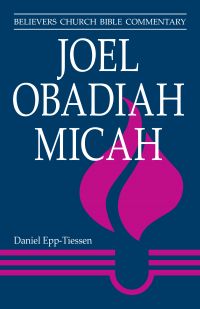Joel, Obadiah, Micah
Éditeur : MennoMedia
ISBN numérique ePub: 9781513801452
Parution : 2022
Catégorisation :
Livres numériques /
Autre /
Autre /
Autre.
Formats disponibles
| Format | Qté. disp. | Prix* | Commander |
|---|---|---|---|
| Numérique ePub Protection filigrane*** |
Illimité | Prix : 32,99 $ |
*Les prix sont en dollars canadien. Taxes et frais de livraison en sus.
***Ce produit est protégé en vertu des droits d'auteurs.
Description
Although each is quite different, the books of Joel, Obadiah, and Micah are all survival literature. All three address the community that survived the crushing Babylonian destruction of Judah in 586 BCE. And all three seek to help this community cope by giving voice to its disorientation, trauma, anxiety, and rage. Each book insists that God will wrestle a positive future out of catastrophe, granting both physical and spiritual renewal. No matter how dire the circumstances, Israel can trust in the gracious God who will never abandon the faith community.
In this thirty-fifth volume in the Believers Church Bible Commentary series, Old Testament scholar Daniel Epp-Tiessen explores the diverse, yet related content of these three prophetic books, always paying attention to how they might speak words of grace and healing into the disorientation, exile, and challenges of our own time. He also confronts the theologically problematic features of these books, especially their conviction that the salvation of God’s people requires that God obliterate their enemies. This volume explores how we might read Joel, Obadiah, and Micah in light of the larger biblical story of God’s saving purposes that reach their fulfillment in Jesus Christ.
About the Believers Church Bible Commentary series
This readable commentary series is for all who seek more fully to understand the original message of Scripture and its meaning for today—Sunday school teachers, members of Bible study groups, students, pastors, and other seekers.
—From the Series Foreword
Although each is quite different, the books of Joel, Obadiah, and Micah are all survival literature. All three address the community that survived the crushing Babylonian destruction of Judah in 586 BCE. And all three seek to help this community cope by giving voice to its disorientation, trauma, anxiety, and rage. Each book insists that God will wrestle a positive future out of catastrophe, granting both physical and spiritual renewal. No matter how dire the circumstances, Israel can trust in the gracious God who will never abandon the faith community.
In this thirty-fifth volume in the Believers Church Bible Commentary series, Old Testament scholar Daniel Epp-Tiessen explores the diverse, yet related content of these three prophetic books, always paying attention to how they might speak words of grace and healing into the disorientation, exile, and challenges of our own time. He also confronts the theologically problematic features of these books, especially their conviction that the salvation of God’s people requires that God obliterate their enemies. This volume explores how we might read Joel, Obadiah, and Micah in light of the larger biblical story of God’s saving purposes that reach their fulfillment in Jesus Christ.
About the Believers Church Bible Commentary series
This readable commentary series is for all who seek more fully to understand the original message of Scripture and its meaning for today—Sunday school teachers, members of Bible study groups, students, pastors, and other seekers.
—From the Series Foreword























